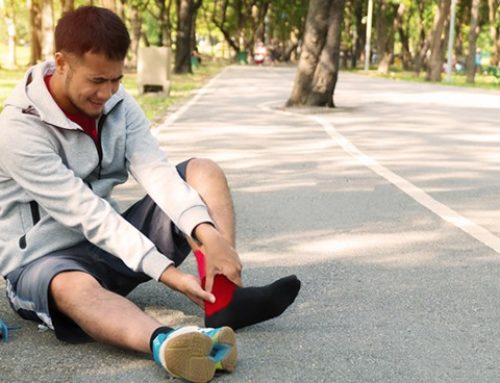3 Ways to Prevent the Most Common Hockey Injury
Hockey players often complain about lower-back pain or tightness in their hip flexors. This can initiate one of the most common hockey injuries—the hip flexor strain.
Think of all the work baseball players do at the shoulder and the potential for injury there. The same applies to hockey players’ hips. Players who want to compete at the highest level need to take care of their hips throughout their playing and during their off-seasons.
Usually the root cause of hip problems in hockey are weak hip flexor muscles like the psoas. When these muscles are too weak, smaller muscles must overcompensate. A muscle that’s overworked is usually setting itself up for injury.
RELATED: 5 Mistakes Hockey Players Make That Lead to Injury
Hockey players: here are 3 ways to avoid straining your hip flexors:
1. Foam Rolling
In particular, concentrate on foam rolling your adductors, the muscles on the inside of the leg that pull the leg toward the body. The skating motion causes the adductors to do quite a bit of work over the season. Foam rolling alleviates the pain and soreness from overuse.
2. Hip Mobility Exercises
Fire Hydrants are an excellent drill because they take the hip through a number of movements, such as circumduction, adduction and abduction.
3. Stretching and Strengthening the Psoas
This major hip flexor muscle needs special attention. To stretch the psoas, all you need to do is lie on your back on a flat bench with one leg touching the floor. Hug your other leg around the knee and bring it in tight to your upper body. It’s important not to overcompensate anywhere in the body, like by over rounding your lower back.
One exercise to strengthen the psoas muscle: the Hanging Leg Raise. Since the only way to really put the psoas to work is to elevate the knee above the hip, elevate your feet just above hip height while performing the exercise.
Learn how your underwear can save you from a hockey injury.
For more hockey training information visit Elite Hockey Power.
RECOMMENDED FOR YOU
MOST POPULAR
3 Ways to Prevent the Most Common Hockey Injury
Hockey players often complain about lower-back pain or tightness in their hip flexors. This can initiate one of the most common hockey injuries—the hip flexor strain.
Think of all the work baseball players do at the shoulder and the potential for injury there. The same applies to hockey players’ hips. Players who want to compete at the highest level need to take care of their hips throughout their playing and during their off-seasons.
Usually the root cause of hip problems in hockey are weak hip flexor muscles like the psoas. When these muscles are too weak, smaller muscles must overcompensate. A muscle that’s overworked is usually setting itself up for injury.
RELATED: 5 Mistakes Hockey Players Make That Lead to Injury
Hockey players: here are 3 ways to avoid straining your hip flexors:
1. Foam Rolling
In particular, concentrate on foam rolling your adductors, the muscles on the inside of the leg that pull the leg toward the body. The skating motion causes the adductors to do quite a bit of work over the season. Foam rolling alleviates the pain and soreness from overuse.
2. Hip Mobility Exercises
Fire Hydrants are an excellent drill because they take the hip through a number of movements, such as circumduction, adduction and abduction.
3. Stretching and Strengthening the Psoas
This major hip flexor muscle needs special attention. To stretch the psoas, all you need to do is lie on your back on a flat bench with one leg touching the floor. Hug your other leg around the knee and bring it in tight to your upper body. It’s important not to overcompensate anywhere in the body, like by over rounding your lower back.
One exercise to strengthen the psoas muscle: the Hanging Leg Raise. Since the only way to really put the psoas to work is to elevate the knee above the hip, elevate your feet just above hip height while performing the exercise.
Learn how your underwear can save you from a hockey injury.
For more hockey training information visit Elite Hockey Power.
[cf]skyword_tracking_tag[/cf]









